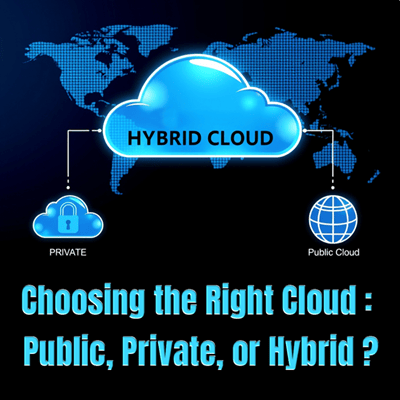


Cloud computing services for business provide the possibility of managing virtual resources.
Advancements in technology have made companies increasingly dependent on cloud computing for storing data, running applications, and improving business efficiency. However, the challenge often lies in choosing the right type of cloud service. This brings up a key question: Should you opt for cloud servers from a public cloud provider, build an “in-house” network, or maybe combine both in a hybrid cloud approach? To help you decide, I will break down the pros and cons of each option to determine which one best suits your needs.
Cloud computing services for business provide the possibility of managing virtual resources, e.g. storage, servers, and applications, over the Internet, thus replacing the physical hardware needed. The public, private, and hybrid are three main models of cloud services. They all have their own positive points and are all made for different business needs.
A public cloud computing provider offers cloud services over the internet to many clients. The infrastructure is owned and managed by companies that specialize in cloud services, such as AWS, Microsoft Azure, and Google Cloud. Public cloud computing became popular due to its cost-effectiveness, as companies don’t have to invest in expensive hardware or IT infrastructure. It also provides flexibility, allowing businesses to scale up or down as needed, which helps with smooth transitions.
Other benefits of public clouds include reliability, as service providers ensure uptime and security, and minimal maintenance, since the provider handles updates and security patches. Public cloud services are especially effective for startups, small businesses, companies with unpredictable workloads, or those needing quick and easy access to services.
However, public clouds come with some drawbacks. Companies have less control over their data and infrastructure, and shared resources could lead to potential security risks. Additionally, there is a possibility of performance issues if the provider experiences any problems.
A private cloud network is dedicated to a single organization, either hosted on the company’s premises or by a third-party provider, but it is used exclusively by that business. The key benefit of a private cloud is enhanced security, as the resources are not shared, offering better data protection and privacy. Organizations also have more control over the cloud infrastructure, allowing them to customize it according to their specific needs.
Private clouds are particularly suited for organizations with strict regulatory compliance requirements, such as large businesses in sectors like healthcare, banking, and government, which need high levels of security and compliance.
However, private clouds come with higher costs due to the need for specialized hardware, maintenance, and IT staff. Additionally, they offer limited expansion compared to public clouds, and skilled personnel are required to manage and maintain the infrastructure.
A hybrid cloud combines both public and private cloud services, allowing applications and data to move between the two clouds as needed. This model offers flexibility by enabling businesses to use public cloud services for non-sensitive tasks while keeping sensitive data in private cloud environments. It can also be more cost-effective, as companies can control costs by utilizing both public and private resources.
The performance of a hybrid cloud is also improved because workloads are distributed in a way that maximizes efficiency. By using multiple cloud environments, hybrid clouds help minimize downtime, benefiting both business operations and productivity. Hybrid cloud solutions are often seen as a good balance for businesses that need security without sacrificing cost, organizations with variable workloads, and those requiring disaster recovery.
However, hybrid clouds are more complex than single-cloud models. They require integrations between private and public cloud services, which can raise concerns over data transfers between different environments.
Cloud adoption depends on various factors, such as the size of the company, budget, security needs, and the type of workload. Public clouds are often the most efficient and cost-effective, making them a good option for startups and small businesses. Private clouds, on the other hand, offer more security and control over data, making them ideal for companies with sensitive information. Hybrid clouds provide better manageability and cost-effectiveness but can still have security concerns.
Each cloud computing model has its own strengths and challenges. If minimizing costs and scalability are your priorities, a public cloud provider is the way to go. For companies that prioritize information security and control, a private cloud network would be the best choice. Hybrid clouds offer a balance, providing both security and cost-effectiveness.
